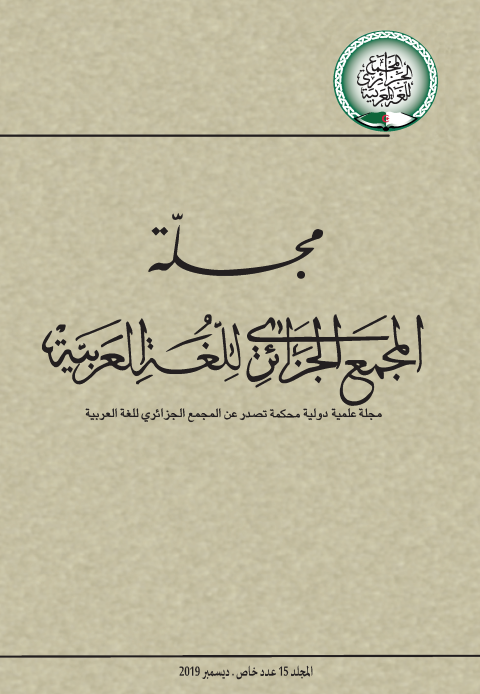المعجم الذهني و تعلم اللغات
DOI:
https://doi.org/10.70443/jaaal.v15i2.50الكلمات المفتاحية:
تعلم اللغات، تعلم المفردات، المعجم الذهني، الحقل الدلالي، اللسانيات النفسيةالملخص
ذا كانت دراسة المعارف المعجمية ولوقت طويل هي مجال علماء النفس والنفسانيين اللسانيين فإنه قد تطور في سنوات الثمانينيات اهتمام متنام لدراسة المعارف المعجمية وتعلم المعجم، وفي هذا المقال سأفحص بداية - انطلاقا من اهتمام أولئك باللسانيات التطبيقية - النتائج التي تحصل عليها كثير من الباحثين ضمن اللسانيات النفسية فيما يخص المعجم الذهني، ثم أصف نتائج سلسلة من البحوث التي أنجزت فيما يخص نجاعة عدد من العوامل مثل السياق والأصوات والصورة في مجال تعلم الكلمات، وأخيرا أعرض نتائج دراسة حديثة منجزة بجامعة أمستردام تتعلق بأهمية مختلف هذه العوامل.
التنزيلات
المراجع
Aitchison, J. (1987) : Words in the Mind: An introduction to the mental lexicon. Oxford, Blackwell.
Anderson, J.R. (1983) : The architecture of cognition. Cambridge (Ma), Harvard University Press.
Arnaud, P. (1993) : Estimation subjective des fréquences des mots en L1 et L2. In Arnaud, P.& P. Thoiron (éds.), Aspects du vocabulaire. Lyon, Presses Universitaires de Lyon.
Arnaud, P. (1993) : Mille lapsus. Manuscrit non-publié, CRTT, Université Lumière-Lyon 2.
Beheydt, L. (1989) : De vergeten leerprincipes : Cognitieve aspecten van de woordenschatverwerving. Toegepaste Taalwetenschap in Artikelen, 34, 42-50. DOI: https://doi.org/10.1075/ttwia.34.06beh
Dijkstra, A. & W.J.B. van Heuven (2002) : The architecture of the bilingual word recognition system: from identification to decision. Bilingualism: Language and Cognition, 5, 175- 197. DOI: https://doi.org/10.1017/S1366728902003012
Diller, K. (1978) : The language teaching controversy. Rowley (Ma), Newbury House
Grainger, J. (1993) : Visual Word Recognition in Bilinguals. In Schreuder, R. & B. Weltens (eds.), The Bilingual Lexicon, Amsterdam, Benjamins, 11-27. DOI: https://doi.org/10.1075/sibil.6.03gra
Greidanus, T., Bogaards, P., Nienhuis, L. van der Linden, E. & T. de Wolf (2004) : The construction and validation of a deep word knowledge test for advanced learners of French. In Bogaards, P. & B. Laufer (eds.), Vocabulary in a Second Language, Amsterdam, Benjamins, 191-208. DOI: https://doi.org/10.1075/lllt.10.14gre
Hamers, L (à paraître) : Apprendre des mots à l'aide du son et des images. Mémoire de Maîtrise, Université d'Amsterdam.
Hazenberg, S. & J.H. Hulstijn (1992) : Defining a minimal receptive second language vocabulary for non-native university students: an empirical investigation. Applied Linguistics, 17, 145-163. DOI: https://doi.org/10.1093/applin/17.2.145
Huckin, T. & J. Coady (1999) : Incidental vocabulary acquisition in a second language: a review. Studies in Second Language Acquisition, 21, 181-193 DOI: https://doi.org/10.1017/S0272263199002028
Hulstijn, J.H., Hollander, M. & T. Greidanus (1996) : Incidental vocabulary learning by advanced foreign language learners: the influence of marginal glosses, dictionary use, and reoccurrence of unknown words. The Modern Language Journal, 80. DOI: https://doi.org/10.2307/329439
Hulstijn, J. & C. Tangelder (1991) : Semantic and Phonological Interference in the Mental Lexicon of Learners of English as a Foreign language and Native Speakers of French. Actes du 1er congrès international Mémoire et Mémorisation dans l'acquisition et l'apprentissage des langues. Bruxelles, CCL, 143-165.
Kerkman, H. & K. de Bot (1989) : De organisatie van het tweetalige lexicon. Toegepaste Taalwetenschap in artikelen, 34, 115-121. DOI: https://doi.org/10.1075/ttwia.34.15ker
Laufer, B. (1992) : How much lexis is necessary for reading comprehension? In H. Béjoint & P. Arnaud (eds.), Vocabulary and Applied Linguistics, London, Macmillan, 126-132. DOI: https://doi.org/10.1007/978-1-349-12396-4_12
Linden, E.L. (van der), Bogaards, P. & L. Nienhuis (1997) : Translating ambiguous words in a foreign language: An aspect of the bilingual lexicon. In Díaz, L. & C. Pérez (eds.), Views on the Acquisition and Use of a Second Language, Barcelone, Université Pompeu Fabra, 567-576.
Melka-Teichroew, F. (1989) : Les notions de réception et de production dans le domaine lexical et sémantique : étude exploratoire. Bern, Peter Lang.
Mondria, J.A. (1996) : Vocabulaireverwerving in het vreemde-talenonderwijs. Thèse de Doctorat Université de Groningue.
Mulder, K. (2005) : /di:r/ = dier? L'influence de la phonologie sur la reconnaissance des mots en français L2. MA Thesis, Université d'Amsterdam.
Nagy, W.E. & R. Anderson (1984) : How many words are there in printed English schoolbooks? Reading Research Quarterly, 19/3, 304-330. DOI: https://doi.org/10.2307/747823
Nation, P. (1990) : Teaching and Learning Vocabulary. Boston, Heinle & Heinle.
Nation, P. (2001): Learning vocabulary in another language. Cambridge, Cambridge University Press. DOI: https://doi.org/10.1017/CBO9781139524759
Paivio, A. (1971) : Imagery and verbal processes. London, Holt, Rinehardt and Winston
Paivio, A. & A. Desrochers (1981) : Mnemonic techniques in second language learning. Journal of Educational Psychology, 73/6, 780-795. DOI: https://doi.org/10.1037//0022-0663.73.6.780
Potter, Mary C., So, K-F., Von Eckardt, B. & Feldman, Laurie B. (1984) : Lexical and conceptual Representation in Beginning and Proficient Bilinguals. Journal of Verbal Learning & Verbal Behavior, 23, 23-38. DOI: https://doi.org/10.1016/S0022-5371(84)90489-4
Pressley, M, Levin, J.R. & G.E. Miller (1982) : The keyword method compared to alternative vocabulary learning strategies. Contemporary Educational Psychology, 7, 50-60. DOI: https://doi.org/10.1016/0361-476X(82)90007-8
Schouten-van Parreren, C. (1985) : Woorden leren in het vreemdetalenonderwijs. Apeldoorn, van Walraven.
Seashore, R.H. & L.D. Eckerson (1940) : The measurment of individual differences in general English vocabulary. Journal of Educational Psychology, 31, 14-38. DOI: https://doi.org/10.1037/h0053494
Singleton, D. (1993) : Le rôle de la forme et du sens dans le lexique mental en L2. AILE, 3, 2-29. DOI: https://doi.org/10.4000/aile.4887
Van de Brug, J. (2006) : L'apprentissage des mots.Le rôle du contexte phrastique, du son et des images. Mémoire non publié, Université d'Amsterdam.
Verhallen, M. & Schoonen, R. (1993) : Lexical knowledge of monolingual and bilingual children. Applied Linguistics, 14/4, 344-365. DOI: https://doi.org/10.1093/applin/14.4.344
Weinreich, U. (1953) : Languages in Contact. New-York, Publications of the Linguistic Circle of New York
التنزيلات
منشور
إصدار
القسم
الرخصة
الحقوق الفكرية (c) 2019 المؤلفون

هذا العمل مرخص بموجب Creative Commons Attribution-NonCommercial 4.0 International License.













 مجلة المجمع الجزائري للغة العربية تصدر عن
مجلة المجمع الجزائري للغة العربية تصدر عن